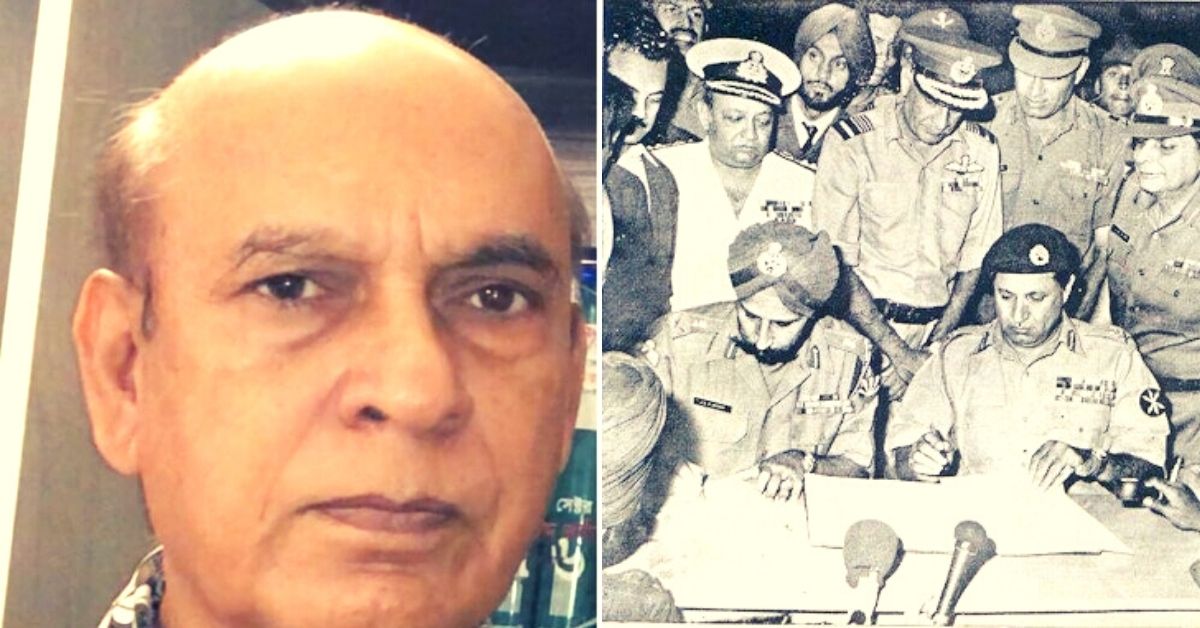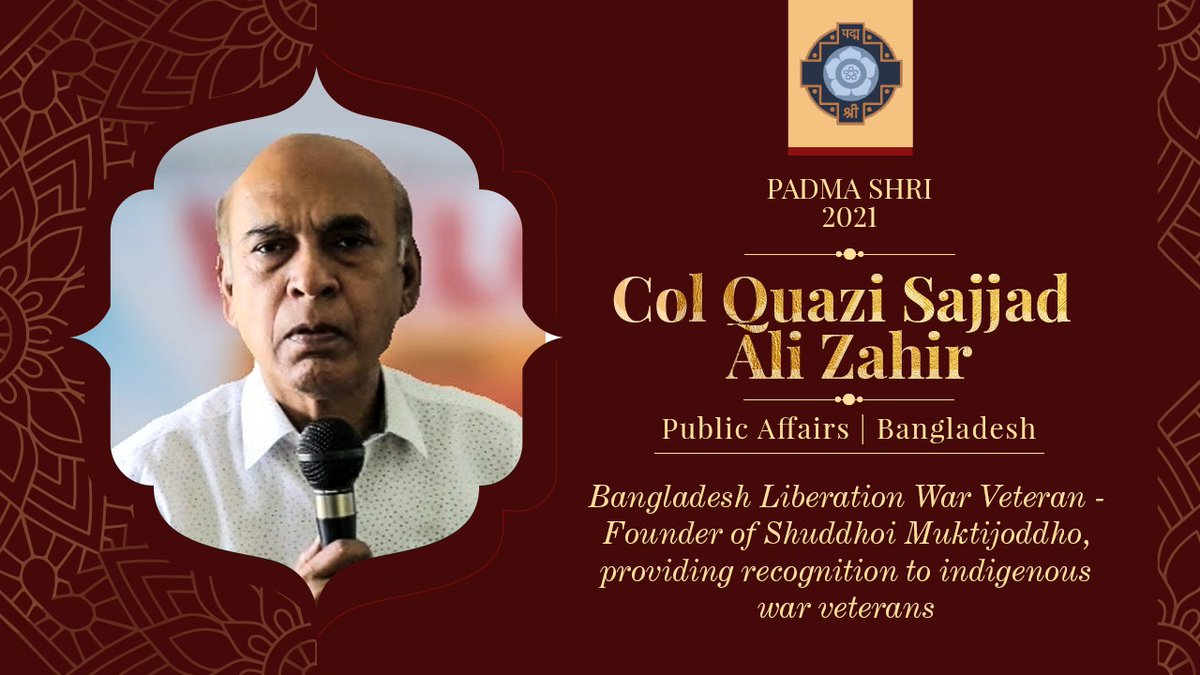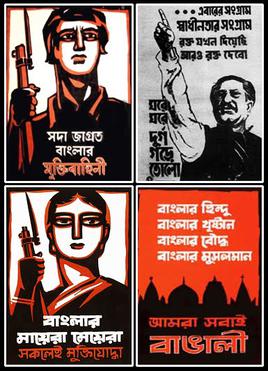How A Pak Army Colonel Fled To India & Won Freedom For Bangladesh in ’71
Col Quazi Sajjad Zahir (Retd), a hero of the 1971 Bangladesh Liberation War, left for India with just Rs 20 in his pockets and whatever information he could gather on the Pakistan Army’s war plans was bestowed with a Padma Shri Award this year.

Lt Colonel Quazi Sajjad Zahir (Retd), a hero of the 1971 Bangladesh Liberation War, was earlier this week honoured with the Padma Shri, the fourth-highest civilian award in the Republic of India. His story is fit for the script of an epic war movie.
(Images above courtesy DD News and Wikimedia Commons)
A former soldier with the Pakistan Army in the erstwhile East Pakistan (now Bangladesh) province, Col Zahir could no longer stomach the brutal atrocities committed on his fellow Bangaldeshis, and fled the country. He left for India with just Rs 20 in his pockets, the clothes on his back and whatever information he could gather on the Pakistan Army’s war plans. After his desertion, the Pakistan Army issued a death sentence against him which stands till this day.

Unspeakable Atrocities
After joining the Pakistani Army, sometime towards the end of 1969, he was commissioned into its Artillery Corps, according to this report by The Print. By March 1971, he was a soldier posted in the Pakistan Army’s elite 14th Para Brigade posted in Sialkot.
Here is what a BBC report stated of the situation in the erstwhile province of East Pakistan.
The conflict was sparked by elections [Pakistan general elections 1970], which were won by an East Pakistani party, the Awami League, which wanted greater autonomy for the region.
While the political parties and the military argued over the formation of a new government, many Bengalis became convinced that West Pakistan was deliberately blocking their ambitions. The situation started to become violent.
The Awami League launched a campaign of civil disobedience, its supporters attacked many non-Bengali civilians, and the army flew in thousands of reinforcements.
On the evening of 25 March it launched a pre-emptive strike against the Awami League, and other perceived opponents, including members of the intelligentsia and the Hindu community, who at that time made up about 20% of the province’s 75 million people.
In the first of many notorious war crimes, soldiers attacked Dhaka University, lining up and executing students and professors. Their campaign of terror then moved into the countryside, where they battled local troops who had mutinied.
This reign of terror began on 25 March following the arrest of Awami League leader Sheikh Mujibur Rahman, who had only weeks earlier on 7 March issued a legendary speech proclaiming that — “This time the struggle is for our freedom. This time the struggle is for our independence”. It was Mujibur who called for civil disobedience in the province and wanted “every house to turn into a fortress”. He knew the fight for Bangladesh’s liberation was on since there was no way the West Pakistan establishment would ever accept the poll results.
Under Operation Searchlight, tens and thousands of West Pakistani soldiers began a campaign of murder, rape, pillage and grotesque violence against Bengali civilians.
While most of the erstwhile Western Bloc, particularly the Unites States, was still unwilling to recognise the situation in Bangladesh, Indian Prime Minister Indira Gandhi termed the attack on Bengali civilians as a “genocide”, as early as 31 March 1971.
It was only months later, on 13 June 1971, when the Western Bloc finally heard independent verification of the brutality involved. It was reported by Anthony Mascarenhas, a Pakistani reporter, and published in the United Kingdom’s Sunday Times.
This is how one of the finest pieces of South Asian journalism began: “Abdul Bari had run out of luck. Like thousands of other people in East Bengal, he had made the mistake — the fatal mistake — of running within sight of a Pakistani patrol. He was 24 years old, a slight man surrounded by soldiers. He was trembling because he was about to be shot.”
The Pakistan Army’s brutal campaign killed 3 million Bangaldeshis, according to the Bangladesh government, while independent researchers peg the figure to between 300,000 and 500,000 deaths. This goes to show that the brutality of the Pakistan Army was real.
As the BBC reports stated: Prime Minister Indira Gandhi told the then editor of the Sunday Times, Harold Evans, that the article had shocked her so deeply it had set her “on a campaign of personal diplomacy in the European capitals and Moscow to prepare the ground for India’s armed intervention.”
Anthony Mascarenhas’ reportage turned global opinion against Pakistan and facilitated the end of the war. Col Zahir, however, was well aware of the situation on ground before the report was published.
The turning point for Col Zahir, was the the 7 March speech by Mujibur, who was popularly known as “Bangabandhu” (Friend of Bengal), followed by the news of the atrocities committed during the genocide against his Bengali people.
This info will be included in my forthcoming book on the war. Thank you Sajjad uncle
— Nadeem Qadir (@qadir_qadir4) January 26, 2021
Speaking to The Print, Col Zahir said, “I decided to desert and crossed into Jammu and Kashmir from the Samba border. I had Rs 20 with me, along with the pants and shirt I was wearing. But I gathered whatever I could on Pakistan’s war plans and got in touch with the Indian Army…My family suffered a lot because of Pakistan. My father’s small house in Dhaka was burnt down. My mother and sister were chased by the Pakistani soldiers from their house till they were able to get a refuge.”
Helping India and Training the Mukti Bahini
After escaping into India, the Indian military vetted him and soon brought him to a secret camp in Sylhet district of Bangladesh, where he began training the Mukti Bahini, the guerrilla resistance movement consisting of the Bangladeshi military, paramilitary and civilians fighting for the Independence of Bangladesh from the clutches of Pakistan.
As The Daily Star, a leading English daily in Bangladesh reported, “He organised the 2nd Artillery Force under Sector-4 in the Sylhet region. With the six 105 mm artillery Indian government gave to the Mukti Bahini, a field artillery battery was formed, of which Col Zahir was the co-captain. Since October [1971], the battery had assisted the Mukti Bahini Z Force in the greater Sylhet region with artillery fire support in various battles.”
During his stint with Mukti Bahini, Col Zahir recalled the pivotal role India’s then defence minister Babu Jagjivan Ram played in the Bangladeshi liberation efforts.
“Babu Jagjivan Ram’s role was fascinating. He used to visit training camps set up for Mukti Bahini fighters in Northeast India. He was solely responsible for coordinating between the then Prime Minister’s Office, Home Minister and Defence Forces,” he said as per this report.
“Reception centres were set up all across East Pakistan; people who possessed the will to take on the challenge of fighting for the Liberation of Bangladesh were screened by the Indian Armed forces and the civilian administration. This task too was overseen by the indomitable Babu Jagjivan Ram,” Col Zahir added.

Post War and Maintaining Legacy
Following the end of the war on 16 December 1971 and Bangladesh’s independence, Col Zahir served for some years until his eventual retirement. Following retirement, however, he has dedicated his life to documenting the immense contributions of both Bangladeshis and Indians, irrespective of whether they were civilians or soldiers, to the cause of freedom.
“The war witnessed violence on civilians at a scale that had not been seen in South Asian battlefields before,” he told The Hindu in 2016. “No other country has done what we are now trying to do, by honouring both Indians and Bangladeshis who died for the same cause.”
So far, he has reportedly written 54 books on the subject, and in 2013, was awarded the Swadhinta Padak (Independence Award), the highest civilian award in Bangladesh.
Is it any surprise that the Government of India conferred the Padma Shri to him this year? My only grouse is that they should’ve awarded him earlier.
(Edited by Yoshita Rao)
Like this story? Or have something to share? Write to us: [email protected], or connect with us on Facebook and Twitter.
If you found our stories insightful, informative, or even just enjoyable, we invite you to consider making a voluntary payment to support the work we do at The Better India. Your contribution helps us continue producing quality content that educates, inspires, and drives positive change.
Choose one of the payment options below for your contribution-
By paying for the stories you value, you directly contribute to sustaining our efforts focused on making a difference in the world. Together, let’s ensure that impactful stories continue to be told and shared, enriching lives and communities alike.
Thank you for your support. Here are some frequently asked questions you might find helpful to know why you are contributing?


This story made me
-
97
-
121
-
89
-
167













